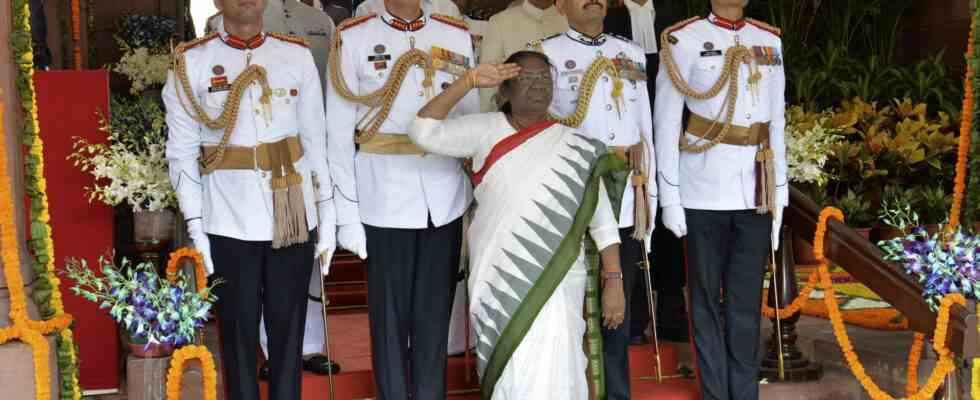portrait
Status: 07/25/2022 3:06 p.m
Draupadi Murmu swore her oath of office today – as the first indigenous woman and the second woman, she is now India’s president. Her post is largely symbolic, but Murmu’s rise is significant.
People in the capital New Delhi, but also in the villages in eastern India hold up their photo, dance and drum: They celebrate their new President Draupadi Murmu, who was sworn in today. The daughter of a village chief in the state of Odisha was born 64 years ago and says about herself: “I am the tribal leader of a very remote village. I belong to the Santhal people, one of the largest indigenous tribes in India.” Her nomination for president alone is “proof of social justice and the advancement of women,” she said before her election.
When Murmu was still a little girl, it is said that her father Biranchi Narayan Tudu took her one day to the next larger city of Rairangpur, where a minister was visiting. Murmu is said to have just walked onto the stage and told him that she wanted to go to secondary school in the provincial capital. The minister was so enthusiastic about the campaign that a school place was organized for her.
In an interview with an Indian television station, her daughter Itishri Murmu says: “There were no roads there yet, it was difficult for her. She was so poor that my family could hardly afford the school fees. A relative then helped her and she has successfully completed both her high school and college.”
Draupadi Murmu is said to have asserted the right to go to school as a little girl.
Image: dpa
A choice with symbolic power
To this day, many indigenous people in India live in complete poverty, around 40 percent of them can neither read nor write. There are around 100 million people from different tribes. India’s indigenous people make up a third of all indigenous peoples around the world. Murmu’s election as president is a sign that poor people in India can also fulfill their dreams, says Shubranshu Choudhary, who campaigns for the rights of indigenous peoples in India. Her appointment is primarily symbolic.
Still, it’s okay, she’s from an indigenous tribe and she’s a woman. Unfortunately, they are still on the last step in our society.
Murmu had worked as a teacher for many years but reportedly refused to receive wages. She understood her job as a service to the general public. 25 years ago she got into politics: she was elected city councilor in Rairangpur – the city where she climbed the stage to become a minister as a child.
Criticism of ruling party BJP
In 2009 her life took a tragic turn: within a few years her eldest son, her husband and the second son died. However, she fought her way back to life and became the first woman to serve as governor of the state of Jarkhand.
“She is an inspiration to our people,” says her daughter Itishri, who has always supported her mother. “If, through hard work and dedication, she gets to the top, then other women of ours will do the same.”
But there is also criticism of the election. Prime Minister Narendra Modi’s ruling BJP party only set up Draupadi Murmu to get more votes from the indigenous community and win elections in their state, it is said – Murmu is being used as a fig leaf to pretend that there is now more for the indigenous people in the country will be done. Because similar to the Federal President in Germany, the President of India also has representative tasks. Nevertheless: Murmu has campaigned for the marginalized people in India all her life and wants to continue to do so.

